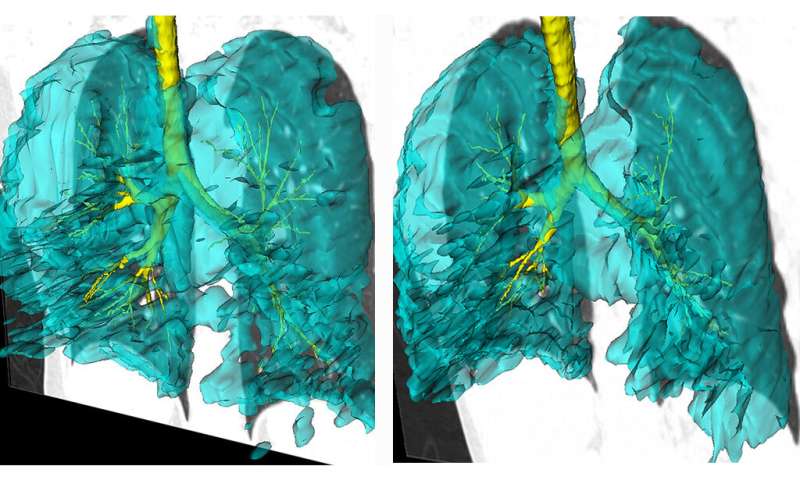

Two lung imaging studies from Western University, including one performed in non-identical twin patients with life-long asthma, have shown that airway defects in the lungs of asthmatic patients are like thumbprints—they have a unique pattern and maintain that pattern over time.
These studies deepen our understanding of asthma and also open up opportunities for personalized therapies that can target specific areas of the lungs.In a study published recently in the journal Radiology, researchers used a specialized MRI technique developed at Western’s Schulich School of Medicine & Dentistry, to follow 11 patients with mild to moderate asthma over a six year period and were able to visualize where air goes in the lungs and more importantly, where it does not.
These pockets of the lungs where there is no fresh air are called ventilation defects, and researchers and clinicians have long thought that these defects are random, wide-spread and change their location in the lungs depending on a number of factors in patients with asthma.
These studies refute that long-standing belief.
“Most of the patients in our study had essentially the same ventilation defects at the first visit and six years later both in terms of size and spatial location in the lungs,” said Rachel Eddy, Ph.D.
Candidate at Schulich Medicine & Dentistry and lead author on the studies. “This tells us that there are focal regions inside the lungs that are abnormal, and these stay that way over time.”
In a case study published today in the journal Chest the researchers used the same technique in a set of twins with asthma. While the twins are non-identical, the researchers found that they actually had identical ventilation defects in the same upper left lung segment, which stayed the same over the duration of the seven year study.
“This result found in twins helps us further understand that asthma is not random, and asthma abnormalities persist over long periods of time in the same lung regions. The airway abnormalities likely have a heritable and environmental component,” said Grace Parraga, Ph.D., Tier 1 Canada Research Chair, Professor at Schulich Medicine & Dentistry and Scientist at Robarts Research Institute.
This finding emphasizes the importance of personalized and image-guided therapy for asthmatic patients. “We see now that patients have different thumbprints of disease, and this points to the need for therapy that is patient-specific,” said Dr. Cory Yamashita, Associate Professor of Respirology at Schulich Medicine & Dentistry.
The researchers also looked at how the MRI ventilation defects predict those patients that transition from asthma to chronic obstructive pulmonary disease (COPD), which does not respond to treatments that help open up closed airways. This novel finding supports previous health care database results and is critical because COPD patients experience constant and persistent shortness of breath and require more hospital-based care and much worse outcomes.
Source: Read Full Article